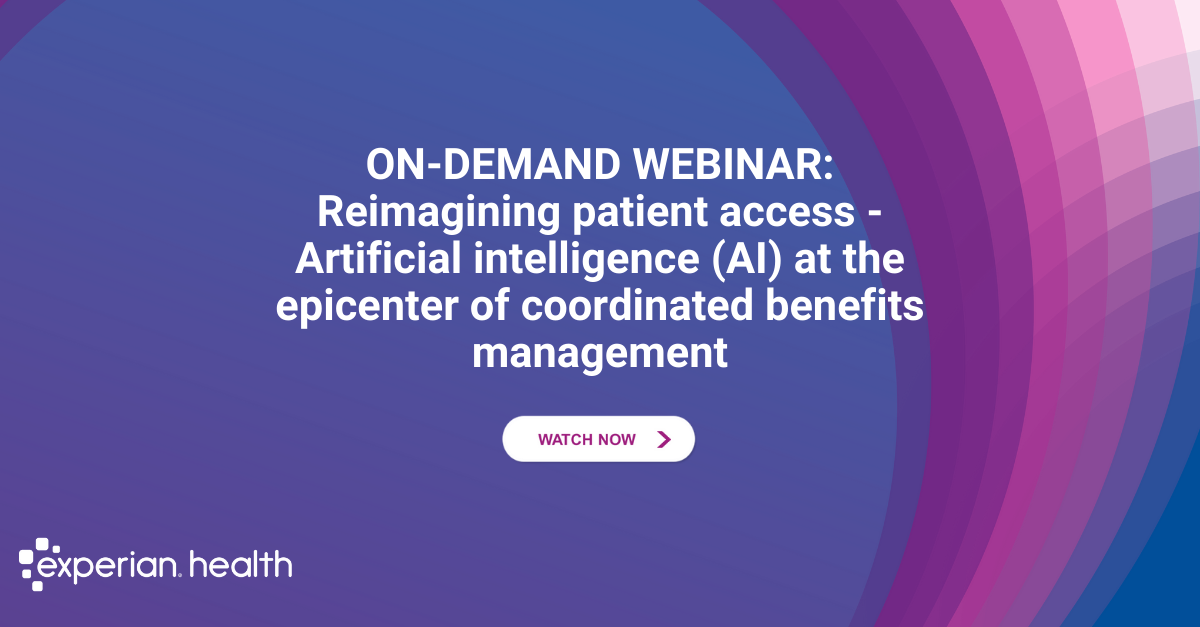At A Glance
AI is modernizing healthcare revenue cycle management by automating manual tasks, improving data accuracy and reducing denials. This Q&A explores how healthcare organizations can utilize AI-driven tools to strengthen their financial performance.
Healthcare organizations are facing a perfect storm: rising claim denials, evolving payer rules, and patients expecting providers to reduce error rates that impact patient billing accuracy. Artificial intelligence (AI) has raised the stakes, causing revenue cycle leaders to feel the pressure to modernize quickly.
According to Experian Health’s State of Claims 2025 survey, 73% of providers agree that claim denials are increasing, which is a clear signal that outdated processes cost providers millions. The top-ranked reasons for denials included coding errors, missing or inaccurate data, authorizations, and incomplete information, to name a few. And with only 14% of providers using some form of AI technology in their processes, the message is clear: the opportunity is high to get more providers to embrace the technology and reap the benefits of smarter automation.
To stay competitive and financially viable, healthcare organizations must embrace AI-driven innovation that improves data accuracy, streamlines workflows and proactively prevents revenue leakage. To explore how leading RCM companies are responding, we interviewed David Figueredo, Experian Health’s VP of Innovation, to get a closer look at how we’re helping healthcare organizations use AI to tackle these challenges head-on.
Meet the Executive
David Figueredo, VP of Innovation at Experian Health, has spent over 20 years driving transformation in healthcare finance. Known for blending tech-forward thinking with operational expertise, David is passionate about using AI to solve persistent challenges in revenue cycle management, especially around claim denials and data accuracy. He believes that healthcare innovation must be both purposeful and scalable.
“We’re not just chasing trends, and buzzwords do not functionally solve problems,” he says. “By focusing on building systems that adapt to payer behaviors and addressing the labor costs and manual inefficiencies providers face today, we can deliver measurable improvements in financial performance.”
David is passionate about building tools that empower revenue cycle teams to work smarter, not harder. “We’re not just layering tech on top of broken processes,” he says. “We’re redesigning the workflows themselves to intuitively account for these emerging AI capabilities and by doing so, we are finding ways to fundamentally change those processes.”
Q1: “David, let’s start with the big picture. How are you and your team thinking about innovation in revenue cycle management right now?”
David: “At Experian Health, innovation is a strategic imperative, and the core to everything we do. We’re focused on solving revenue cycle pain points, especially around claims management and patient access by blending AI, automation, and data intelligence to streamline workflows. We’re not just trying to overlay new tech on yesterday’s processes; we’re reimagining how revenue cycle teams will operate, to reduce manual touch points and increase automated decisioning. That means leveraging AI to automate repetitive tasks, enable earlier and continuous monitoring with timely corrections, and equipping teams with actionable workflows backed by trustworthy, transparent insights.
We’re also seeing a shift in mindset and attitudes around automation and applied AI. Innovation used to be a long-term goal that took years to see measurable outcomes. Now, it’s a short-term mandate where the pace of progress needs to deliver value today and increased value tomorrow. Our clients expect to see and feel the progress now, not just the promise of value in years to come. That’s why we’ve designed a modular solution that allows clients to deploy AI tools where they deliver the most immediate value, while also supporting more complex workflows and integrations for the future. This includes integrating intelligence to improve eligibility checks, coordination of benefits (COB) and identity functions, enhancing claim scrubbing processes with accurate denial prediction and prioritization, and strengthening financial decisions with better data modeling that builds trust.
Innovation should be cross-functional. This means aligning product design with IT build processes to reduce deployment times and mitigate risks, incorporating operations teams to ensure the right problems are being addressed, and enabling finance teams to better understand how technology impacts primary and secondary revenue streams.”

Watch our on-demand webinar to learn how healthcare organizations are using AI to eliminate manual payer chaining, detect and correct coverage issues in real-time, and reduce claim denials.
Q2: “AI is everywhere these days, but how are you actually using it to reduce claim denials and improve data accuracy?”
David: “AI can be a game-changer, but there is more to solving problems than just applying new technology. According to Experian Health’s State of Claims 2025 report, 41% of respondents say their claims are denied more than 10% of the time. And 54% agree that errors in claims are increasing. We have to be thoughtful in how and where we apply AI to improve learning on the fly, promote integrated decision support in real time and automate actioning so that highly skilled and limited staff can focus on higher-value functions. AI is not just about automation; it’s about intelligent intervention applied to real problems, removing guesswork, early issue identification and eliminating missed steps to improve the overall yield of the revenue cycle.
Consider the denial space, where billions in revenue are lost each year. While the causes of denials are very diverse, many of them are excellent opportunities for applied AI to improve denial rates. Our flagship product, Patient Access Curator™, uses AI to address key drivers, such as eligibility and COB errors that account for 15-30% of all denials. AI can surveil system and user activity to detect missed coverage or primacy issues, then pursue those leads and update the HIS in real-time — both at registration and at every other touchpoint in the patient journey.
Another great example of applied AI is our AI Advantage™ denial prediction and triage solution. While claim denial screening and prioritization are not new concepts, AI takes this to a new level by integrating behavioral analytics, machine learning processes and big data analytics into a simplified process. This solution doesn’t just detect denials; it prioritizes them based on financial impact and likelihood of denial recovery, driven by a larger decision support framework that improves accuracy and reduces noise. Revenue cycle teams can then focus on high-value, revenue-protecting activities, rather than low-yield procedural work.
Our models continuously learn from evolving payer behaviors as they emerge, to predict denial risk and recommend corrections in real time. And because they’re continuously learning, they get smarter and vastly more adaptive than legacy ways of prioritizing pre-denial and denial workflows. It’s a dynamic system that evolves with the payer landscape that maximizes limited resources, which I think is the hope and expectation of modern, AI-driven revenue cycle processes.”
Q3: “Can you give us a sense of the impact? What kind of results are clients seeing with AI tools?”
David: “Absolutely. We are seeing some amazing early data that clearly point to very differentiated outcomes over traditional technology approaches. Since deploying our AI-driven denial prevention engine, we’ve seen a 15-60% reduction in initial eligibility and COB claim denials, with an average performance of ~30% reduction across our client base. However, the impact is not just on claim denials; we have to understand there are populations of patients, such as self-pay patients, that benefit from improved automation and intelligence that AI applied correctly can bring.
We are also seeing significant reductions in self-pay at registration rates when AI is driving the automation. Here, we see ~25% reductions in self-pay at the time of registration. This is relevant and striking on so many levels, as correct estimates can now be provided pre-service, and authorization processes can now work more effectively, which leads to better patient experiences.
What’s most impactful is how these results compound over time. As AI tools mature, they start identifying systemic issues—like recurring documentation gaps or payer-specific quirks—that manual reviews often miss. That insight enables clients to fix individual claims while optimizing workflows and upstream processes, leading to long-term gains in efficiency and revenue integrity.”
Learn how Patient Access Curator streamlines patient access and billing, prevents claim denials, improves data quality, and makes real-time corrections to boost your healthcare organization’s bottom line.
Q4: “Let’s talk about the patient side. A lot of innovation is happening behind the scenes, so how does that translate into a better patient experience?”
David: “That’s a great point. A lot of what we do in revenue cycle innovation isn’t visible to patients, but it absolutely impacts their experience. In many cases, our patients are the victims of broken processes and fragmented data that AI and related technology improvements will help to resolve.
Take claim denials, for example. When a claim is denied because of a missing authorization or incorrect insurance information, it doesn’t just delay payment; it creates confusion and stress for the patient who may suddenly receive a surprise bill for something outside of their control. Resolving this issue requires multiple calls to the provider or payer, which adds frustration. This creates a stressful experience and negatively impacts the provider’s brand perception.
That’s where AI makes the difference. We use Experian Health’s AI-powered registration optimization and claims management tools, like AI Advantage, to catch these issues early, before the incorrect estimate is generated, before the authorization is missed or before the claim is submitted. This drives more consistency and automation into the revenue cycle. By improving data accuracy at the front end—with things like insurance verification, COB issue detection, automated coverage surveillance and predictive analytics — we’re helping providers get it right the first time. The result: fewer billing surprises, faster resolutions and a smoother patient journey.
While the patient may not see the AI working in the background, they feel the difference when their estimates are more accurate, duplicate or conflicting statements are reduced, and they no longer have to chase down answers. This builds trust and improves patient satisfaction – allowing them to focus on their health, rather than revenue cycle issues they should never have to deal with.”
Q5: “For healthcare organizations that are just starting to modernize their revenue cycle, where should they begin?”
David: “Start by understanding your internal views, change threshold and restrictions. Many healthcare providers don’t ask hard questions about their goals, the data they’re willing to share or how to prioritize their needs. AI is only as good as the data it has access to, so ensure your data is clean, structured, and compliant with legal and clinical requirements.
Next, find partners with the right technical tools and healthcare experience. Focus on measurable outcomes —not just technology—and prioritize areas with the greatest revenue leakage, high FTE investments or elevated patient risk. Don’t underestimate the importance of change management. Involve your operations, training and strategy teams early, and make them part of the innovation process. Overemphasize the human element of change control to improve outcomes.
Finally, always keep the patient in mind. Every improvement in the revenue cycle affects their experience and access to care. Design technology solutions that simplify the patient journey, reduce their burden, and help lower the cost of care.”
The future of RCM lies in AI innovation
As healthcare organizations navigate mounting financial pressures and the increasing complexity of payer requirements, the need for smarter, AI-powered solutions has never been greater. By embracing intelligent automation, providers can reduce costly errors and denials, strengthen their financial stability and enhance patient experiences.
Learn how Experian Health’s AI-driven solutions, like Patient Access Curator and AI Advantage, can help your healthcare organization minimize claim denials, streamline workflows and unlock new opportunities for financial success.


